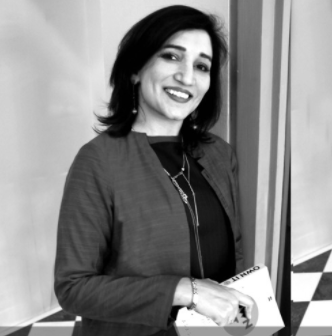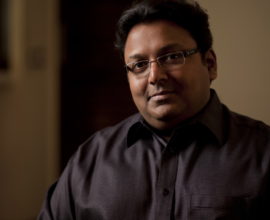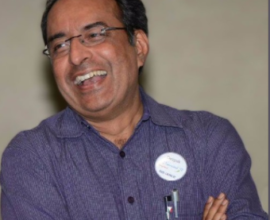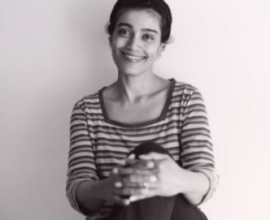Ex-Marketing Head of HarperCollins, Aparna Jain’s Advice for First Time Authors
Here’s the transcript of the podcast:
[Music]
Kiruba: Hello and welcome to the first book podcast – India’s first podcast especially for those who have dreams and aspirations to become an author. My name is Kiruba Shankar and every week, I speak with experienced and bestselling authors to understand their writing habits, best practices, and tips to help you successfully author your first book. This podcast is supported by NotionPress, India’s largest publishing platform. Their goal aligns perfectly with that of this podcast, which is to help you become a published author.
In this episode, we speak to Aparna Jain who has authored a book on Women Leadership called ‘Own It: Leadership Lessons From Women Who Do. The book stems from the fact that she is a strong advocate for equal gender rights and increasing the number of women leaders in the workplace.
She has spent the last 23 years in various industries in Corporate India and in Media. She is India’s only Integral Master Coach and now runs her own marketing consultancy and Integral-based coaching practice called Zebraa Works. She was the Country Manager for Partridge India, a self-publishing company with Penguin Random House. She was earlier the Marketing Head at HarperCollins and an Executive Director at Tehelka. So, she clearly knows a thing or two about publishing. Let’s now listen to what advice Aparna Jain has for authoring your first book.
[Music]
Kiruba: Aparna, thank you so much for coming on the first book podcast.
Aparna: Thank you so much, Kiruba. It’s a pleasure being here.
Kiruba: Congratulations on the launch of your book Own It. So, can you give us a quick intro about the book?
Aparna: So, Own It is a book which is written about women in the corporate workplace. I spent 12 months writing it and I thought it was an essential book to write simply because the way things are today. It’s a 97,000-word book. It’s been out in the market for 4 months and it’s already in second reprint and I’m pretty happy.
Kiruba: Congratulations. I loved the book cover. It’s just so professionally designed. The story behind the book cover please.
Aparna: Yes, the whole concept behind Own It is that there are a lot of issues that were in the corporate workplace. And it’s like a bit of a maze in the corporate workplace for women because we get up so many more challenges than a man does. The designer of the book cover, her name is Bonita, and she is an excellent designer. She decided that she would use one of the childhood games we had. I don’t know if you remember; it’s a little plastic kind of a circular toy and there are three little metal balls in it. And there’s a maze. And then you have to try to get the metal balls right into the center; and it’s really tough because you keep losing a ball from the center and it’s like kind of crazy. So, she used that entire concept and that’s how she made the cover to give a metaphorical reference to the fact that the corporate workplace can be a maze and we hit up against a lot of walls.
Kiruba: And talk about balancing!
Aparna: Yeah, that’s a good one. Talk about balancing! [Laughs]
Kiruba: I had a shudder when you mentioned the number 97,000 words…that’s a lot. I know first time authors actually face through this hurdle even before they get started. Oh my goodness, 70,000 words 90,000 words. I can’t do it. I’m not capable of doing this and they drop it even before they start. What will be your advice to them?
Aparna: You know, Kiruba. The industry has changed a lot. I don’t think you should set a parameter based on my writing or anybody’s writing for that matter. If you have a story inside of you or a book inside of you, even if it’s 5,000 words, 10,000 words, 15, 000 words, or even a 100,000 words, put it down because the way people are publishing and writing today has changed. There’s a very successful little novella that’s actually a translation from Kannada which is called Ghachad Ghochad. I would imagine it’s only 20,000 words but the book has done so well in its translated work in the market. There are so many great reviews, people are talking about it, it’s a beautiful little book. Also, if you look at other publishing models like the new Juggernaut app, they are accepting books that are like 5,000 words, 10,000 words so that people can read something once in the night and then go to sleep because people are changing the way their read. There is something called Kindle Single, they are singles where you have a short story and you read that and that’s all you buy for like Rs. 10, Rs. 20 and then you read it and then you are done with it. So, don’t restrict yourself by the number of words and don’t make that your parameter. Your parameter is the content and how good the content is and it doesn’t matter how big or small or long or short it is.
Kiruba: Brilliant! And especially with the shortening attention span, what you say makes so much sense.
Aparna: Absolutely.
Kiruba: How did the book help you in your business because every time people think of writing a book, behind, at the back of mind, they are thinking about what’s the effort vs benefit analysis; is it really worth my time; there’s a lot of opportunity lost. So how has the book benefited you?
Aparna: None of the things actually ran through my head when I wrote the book. For me, there was a book I felt needed to be written and I wrote it. Did it take a lot of my time? Yes. Did it kill a lot of my business because I was concentrating on it? Yes. I felt there was a larger purpose to my book and I wrote it. How has it helped me? I think now a lot of people consider me as an authority on the diversity space and they call me to speak to the women in their office. I’ve been called in a couple of television shows. It’s given me that but I don’t know if it has helped my business so to speak.
Kiruba: That’s interesting because one of the biggest tangible outcomes that I felt personally in the books that I’ve authored and also looked at is the kind of the consulting help that the book gives. You know very rarely have we seen people that they make money straight off the book but there are secondary incomes that come out if it.
Aparna: Perhaps that will happen in the future but it is too early say for me right now.
Kiruba: Got it.
Aparna: Yeah.
Kiruba: How long did it take for you to write the entire book?
Aparna: The day I actually started with my first interview. So, incidentally, I interviewed 180 people for this book. I traveled all over the country and I spent my personal money to do this. It was really tough you know. But you don’t really get money for writing books. I spent a lot of my personal money on this because I really felt I was on a mission. It took me one whole year from start to finish to finish all the interviews, transcribe them and put them in the format that I could give my publisher. And then my publisher and I spent six months editing it. So, eighteen months.
Kiruba: That’s wooow!
Aparna: Yeah, I am pretty…yeah…I am not the average writer. I write really fast.
Kiruba:That’s nice. So, I’m just trying to think about the amount of efforts that would have gone in a year and a half for you to have invested yourself. So, how did you maintain momentum when your book spans so long? Because a lot of us can get distracted by work, by deadlines, by personal emergencies. How does one maintain that momentum?
Aparna: You know, I think if you’ve invested in your work, it’s like a work day. You have to consider writing as part of something you do in your workday. You have to dedicate X amount of hours every day to it. Now, my work was a little sporadic because my interviews were all over the place. I had to come back, download them, transcribe them, and they were 90 minutes of interviews that I had to transcribe. So, aside from spending about two or three hours with the person with the commute and talking to them, then I had to come back and spend another one and a half hours transcribing them. And pause and write, pause and write, and pause and write. So, it would take two to two and a half hours for every interview to be transcribed. So, that was like straight of five hours a day if I did one interview a day and if I did two, it was more. So, I had no choice but to maintain a discipline. Like I said, if you are committed to the exercise, you will make the time. If you are not and if you say I’ll do it tomorrow, you will tend to fall back so dramatically and then there’s no point because the topic loses its relevance after a while.
Kiruba: And you lose the interest in the book as well.
Aparna: It depends on what kind of a book you are writing. If it’s a nonfiction, I don’t think so. But if it’s fiction, you could get writer’s block and you might say you want to be inspired more. These things could happen to you.
Kiruba: What’s your schedule like? Are you a morning person or are you a night owl? How do you eek out time between your consulting and work.
Aparna: 4. a.m in the morning I would get up and start writing because it was very strange. I have the best ideas when I’m sleeping. I don;t know how it happens but like I’ll dream about some ideas and I used to keep something called a boogey-board next to my bed, which is just a little digital pad and because I didn’t want to use the phone because I would stay up. So, in the middle of the night, I just get an idea and I just like write two lines I wanted to write about, I should talk about this, I should address this, or maybe I should speak to this person, and then I go back to sleep. But my ideas also buzz in my head that every morning at 4 I would get up, I would pull my laptop that was always on my bed, I would open it and I would just start hammering away. So, morning person from 4 to about 7 or 7:30 I would write. Once I am awake, I am awake. I don;t sleep in the day. But I start to fade very early in the night like I can’t meet people after 6 or 6: 30 or 7 in the evening. Then I need to vegetate. So, I’ll have long morning periods of writing then I do my daily work and then by about 5 or 6 I’ll come back to revisit my manuscript and then by…and I’ll continue to do it till 7 or 7:30 and then I’ll just vegetate in front of the TV because I need to just unwind. It takes me three to four hours to unwind.
Kiruba: Got it. So, interestingly, Aparna, this is the same advice I have consistently heard from a lot of bestsellers saying that morning time is the best time because not only is your body fresh, your mind is also fresh and that’s the right time for creative writing.
Aparna: Yeah. I guess if you are a morning person, it helps because I am a morning person. If I were a night owl and could only work in the night, I suppose my schedule would be different. I don’t know. Some people come alive in the night. I don’t know.
Kiruba: Got it. And did you take in any inspiration from others or tips from other authors that you found particularly helpful?
Aparna: Not really, Kiruba. I really think it’s a if you start, I believe that if you start…look I don’t know. It’s a personal journey. I didn’t really get involved in what other people do it, how other people do it. I had to find my own balance. I keep reading that this author does this and this author does that and it’s a great read like you know you enjoy reading about it. And you can visualize them doing it and it’s cool, but it’s just a movie in your head. What you do is so different from what anybody else does and I think you have to find your own rhythm. But I did, perhaps, find inspiration from was the fact that the stories I’ve heard were so compelling. So, I think my inspiration was the women I was interviewing and really not any other author.
Kiruba: That’s a brilliant takeaway, right? I mean the kind of relationship you would have built and the friendship you would have made. That’s a great takeaway from the book.
Aparna: Absolutely and I’m in touch with a lot of them and we still have a great friendship and since they opened up so much to me, like I know so much about their life, and it’s crazy I can meet them today and it doesn’t matter who the person is and I would be able to tell you what she exactly told me.
[Music]
You were listening to the first book podcast, which is India’s first podcast specially aimed at first time authors. Do tune in every week to notionpress.com/podcast to follow new conversations with bestselling authors to hear their tips and tricks and techniques to help you become a published author. On that note, a word of appreciation to Notion Press for supporting this show. I would love to hear your feedback and encourage you to write to me at kiruba@kiruba.com. Take care and bye.
[Music]





